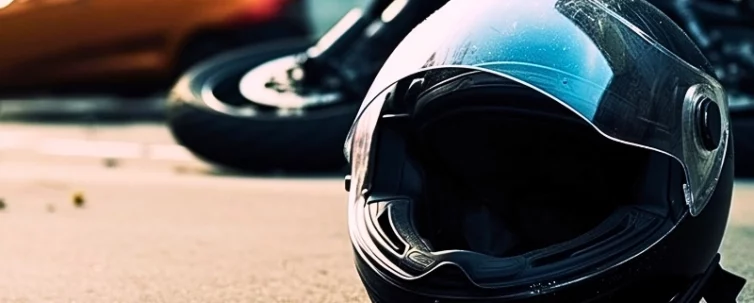What are the helmet laws in Illinois? Illinois doesn’t currently have helmet laws in place for motorcyclists, meaning these laws won’t directly have an impact on an accident case. However, your decision to avoid wearing a helmet could still affect the outcome of your case, as this gear can greatly reduce the risk of injuries.

For help with a motorcycle accident claim or lawsuit in Illinois, call Lloyd Miller Law today at 773-838-8100 to schedule a free consultation with a motorcycle accident lawyer.
Table of Contents
Are There Helmet Laws in Illinois?
There is no Illinois helmet law at this time that will directly impact a motorcycle accident case. These laws used to be in place in Illinois and many other states, but by the 1970s, these laws became obsolete as the U.S. government struggled to penalize motorcyclists for not wearing helmets in states without these laws.
In turn, these former laws will have minimal impact on your case. On the other hand, the state does require you to wear protective eyewear when operating a motorcycle without a windshield.
Also, wearing a helmet is still crucial in protecting against injury, as helmet use plays a big role in motorcycle fatality trends. According to the National Safety Council, motorcyclists comprised 14.6% of traffic fatalities in a recent year, a large percentage.
How Not Wearing a Helmet Can Impact a Personal Injury Claim
While the previous laws in place would have made a motorcyclist liable for not wearing a helmet, motorcyclists could still be legally responsible for their injuries if they choose not to wear a helmet and sustain injuries related to this action, such as a brain injury.
For instance, if you suffer a traumatic brain injury (TBI) and you wish to file an insurance claim to seek compensation, the other party’s insurer might reduce the claim with the belief that your injuries resulted from your own negligence.
Can You Still Recover Compensation If You Weren’t Wearing a Helmet?
It’s still possible to recover compensation in personal injury claims even if the claimant wasn’t wearing a helmet at the time of the accident. Another party might be more clearly liable for causing the accident, or you might suffer injuries extending beyond the head and neck that aren’t related to the act of wearing a helmet.
More specifically, if you suffer a TBI from an accident along with other injuries, the defendant’s insurer or attorney may be willing to cover the other injuries, but deny that the defendant was at fault for the brain injury and damages connected to it.
What Types of Injuries Can Result from Motorcycle Accidents?
So, what are the most common injuries from motorcycle accidents?
These injuries include:
- Soft Tissue Injuries: These injuries include torn, sprained, or strained muscles, tendons, or ligaments.
- Fractured or Broken Bones: Motorcycle accidents also frequently cause broken bones and fractures that can be severe in many cases.
- Chest and Back Injuries: Injuries to the ribs, spine, and other areas of the back and chest could require extensive treatment and potentially result in paralysis.
- Whiplash: This involves the sudden jerking of the head and neck when the body gains momentum before the vehicle comes to a sudden stop.
- Head and Brain Injuries: Bruising, fractures, and TBIs are among some of the various head injuries that victims could sustain, but a helmet can reduce their risk to some extent.
Even if you sustain a brain or head injury due to the lack of a helmet, you may still be able to recover compensation for these and other injuries, depending on the nature of the accident and degree of liability.
Compensation for Motorcycle Accident Injuries
There are a few types of damages available in motorcycle accident cases, such as:
Economic Damages
There are several economic damages that apply to the financial losses related to a case, including medical bills, lost income, lost earning capacity, physical therapy, rehabilitation, and the cost of repairing or replacing equipment.
Non-Economic Damages
Non-economic damages can also impact a case, including pain and suffering, trauma and PTSD, disfigurement, and loss of consortium (relationship). These damages are somewhat harder to prove than economic damages, but it’s possible to document them with a pain journal and incorporate them into a total settlement.
Punitive Damages
Individuals may also seek punitive damages if the case goes to trial, and the defendant is liable for gross negligence or malicious intent. These damages have the goal of punishing defendants for egregious behavior, making an example of them.
Wrongful Death Damages
If a loved one dies as a result of his or her injuries in a motorcycle accident, the victim’s family may also be able to recover certain wrongful death damages. These include the above economic, non-economic, and punitive damages, along with costs stemming from the person’s death, including burial and funeral costs.
Why You Should Consult a Lawyer if You’re Involved in a Motorcycle Accident
If you sustain injuries in a motorcycle accident in Illinois, it’s in your best interest to consult an experienced car accident lawyer to handle your case. The right attorney could help you determine who is liable in a multi-car accident or another type of collision, collect evidence proving liability, calculate damages, and negotiate a claim with insurers. If needed, your attorney may also decide to seek compensation through a lawsuit. Ultimately, having a reputable lawyer by your side could mean the difference between a successful and a lost case.
To schedule a free consultation with one of our personal injury attorneys today, contact us, and we’ll put you in touch with one of our lawyers to discuss your case.





